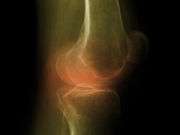(HealthDay)—Total knee replacement usually results in greater pain relief and better joint function after a year than nonsurgical osteoarthritis treatment, researchers report in the Oct. 22 issue of the New England Journal of Medicine.
Soren Thorgaard Skou, P.T., Ph.D., a researcher in the musculoskeletal function and physiotherapy unit at the University of Southern Denmark in Odense, and colleagues randomly assigned 100 patients with moderate to severe knee osteoarthritis to either total knee replacement plus 12 weeks of nonsurgical treatment or to nonsurgical treatment only. The nonsurgical group received physical therapy, diet advice, shoe insoles, and pain medication.
After one year, 85 percent of the joint replacement patients reported clinically significant improvement in pain, compared to 68 percent of the nonsurgical group, the researchers found. Quality of life was improved in the joint replacement group as well, and these surgical patients made bigger gains in ability to walk, climb stairs, and perform other daily activities. However, complications were much less likely in the nonsurgical group.
"Total knee replacement was associated with a higher number of serious adverse events than was nonsurgical treatment, and most patients who were assigned to receive nonsurgical treatment alone did not undergo total knee replacement before the 12-month follow-up," the authors write.
More information:
Abstract
Full Text
Editorial
Journal information: New England Journal of Medicine
Copyright © 2015 HealthDay. All rights reserved.





















